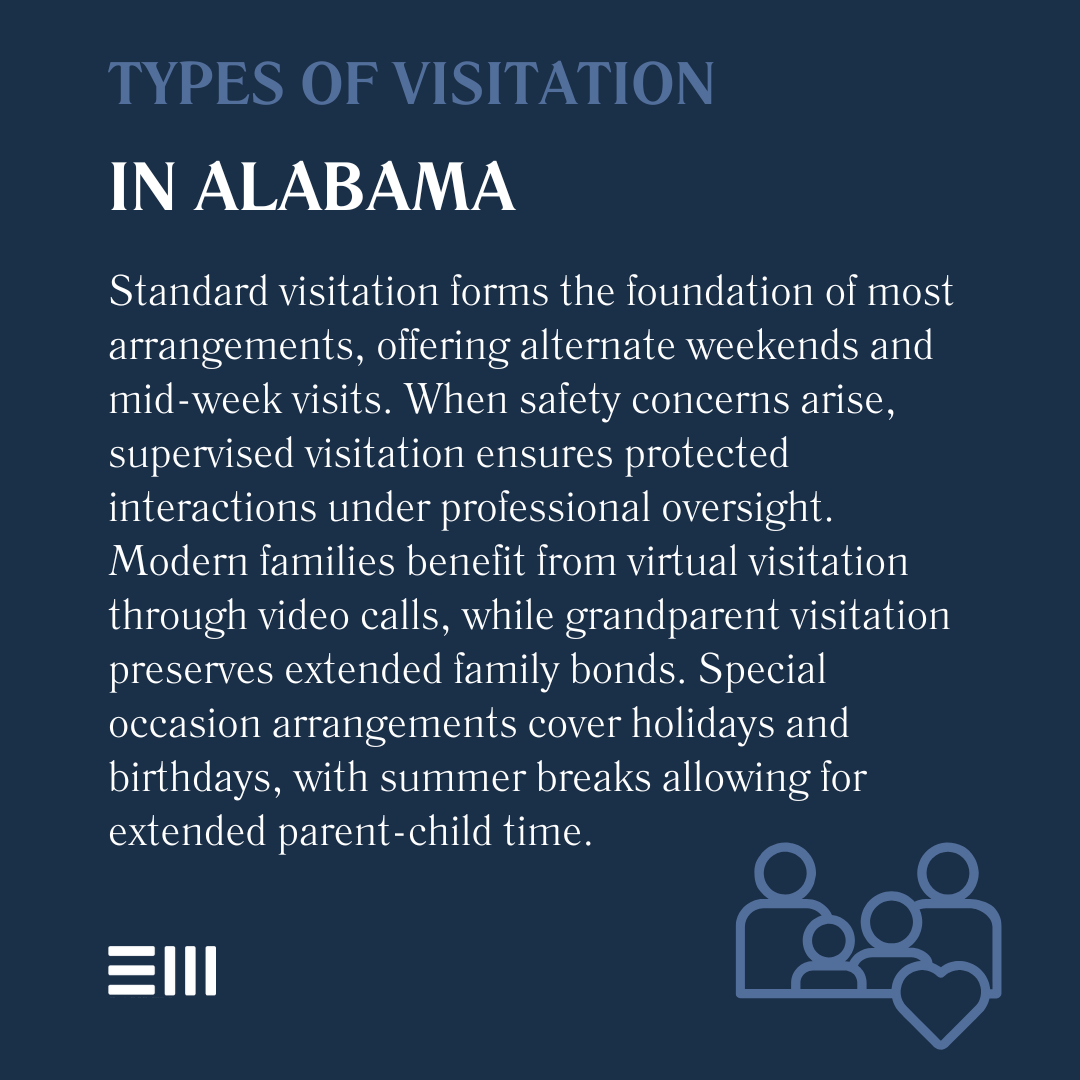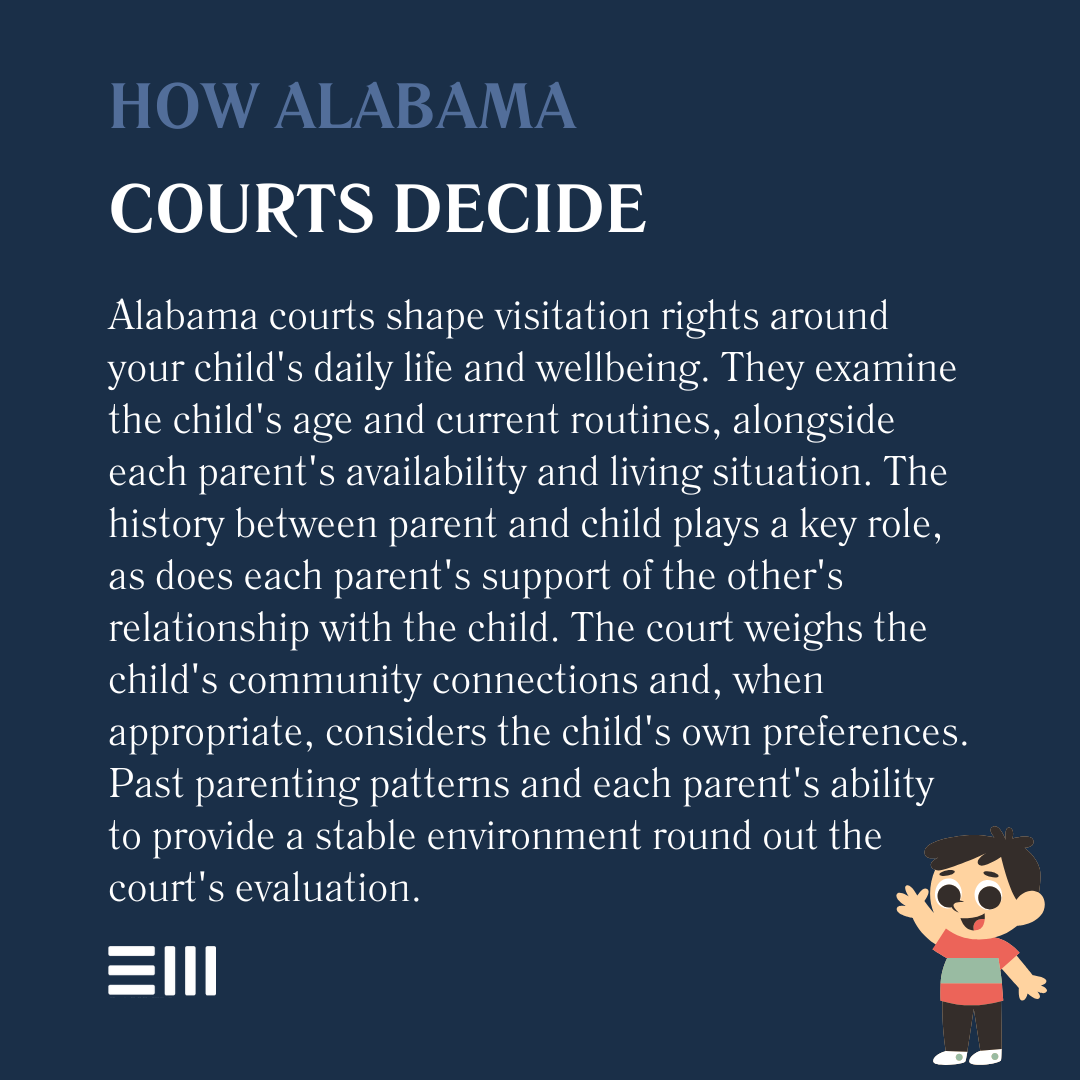Behind every visitation rights case in Alabama lies a family's story of change and adaptation.
When parents separate, maintaining strong bonds with children becomes both a profound emotional journey and a complex legal challenge.
For many Alabama families, these precious parent-child moments—from weekend adventures to bedtime stories—shape relationships that last a lifetime.
Yet the path to establishing and maintaining these vital connections often requires skilled legal navigation through Alabama's family court system.
Understanding Visitation Rights in Alabama
Parents facing separation often discover that establishing and maintaining visitation rights involves complex legal considerations unique to Alabama law.
The state's courts prioritize arrangements that serve the best interests of the child while protecting both parents' rights to maintain meaningful relationships with their children.
Understanding these rights empowers parents to make informed decisions and work effectively with legal counsel.
Types of Visitation Arrangements
Alabama courts have developed various visitation frameworks to ensure children maintain strong bonds with both parents while accounting for each family's unique circumstances and needs.
- Standard Visitation Schedule: Typically includes alternate weekends, mid-week visits, and holiday rotations;
- Supervised Visitation: Conducted under professional oversight to ensure child safety;
- Virtual Visitation: Incorporates video calls and digital communication for distant parents;
- Grandparent Visitation: Special provisions for maintaining extended family relationships;
- Holiday and Special Occasion Arrangements: Detailed schedules for birthdays, holidays, and school breaks;
- Right of First Refusal: Opportunities for additional parenting time when primary caregiver is unavailable; and
- Summer Break Schedules: Extended visitation periods during school vacations.
These arrangements provide the foundation for maintaining strong family bonds while ensuring stability and routine for children.
Factors Courts Consider When Determining Visitation
The Alabama judicial system takes a comprehensive approach when establishing visitation rights, carefully weighing numerous elements to create arrangements that truly serve children's best interests.
- Child's age and developmental needs;
- Each parent's work schedule and availability;
- Distance between parents' residences;
- Child's established routine and activities;
- History of parent-child relationships;
- Each parent's willingness to support the other's relationship with the child;
- Child's preferences (if age-appropriate);
- Any history of domestic violence or substance abuse;
- Parents' ability to communicate and cooperate;
- Each parent's physical and mental health;
- Child's ties to school, community, and extended family; and
- Previous parenting arrangements and their effectiveness.
The court's dedication to thorough evaluation ensures visitation arrangements that support children's emotional and physical well-being while maintaining meaningful relationships with both parents.
Common Challenges in Visitation Rights
Navigating visitation arrangements often presents various obstacles that require careful attention and proactive solutions.
Understanding these challenges helps parents develop effective strategies for maintaining healthy relationships with their children.
Typical Visitation Obstacles
The journey through visitation implementation often reveals common hurdles that families must address:
- Schedule conflicts and coordination issues;
- Communication breakdowns between parents;
- Relocation complications;
- Interference with established visitation times;
- Disagreements over holiday schedules;
- Transportation arrangements;
- Changes in work schedules or family circumstances;
- Integration of new partners or step-siblings;
- Differing parenting styles and household rules;
- Financial disputes affecting visitation;
- Emergency situation protocols; and
- School event coordination.
Addressing these challenges early and maintaining open communication channels helps families establish stable, functioning visitation arrangements.
Modifying Visitation Orders
Life's dynamic nature often necessitates changes to existing visitation arrangements. Alabama law recognizes this reality and provides structured processes for modifying orders when circumstances change significantly.
Steps for Modification
The path to modifying visitation orders requires careful preparation and documentation:
- Document significant changes in circumstances;
- Gather supporting evidence;
- File a petition for modification;
- Attend mediation if required;
- Present your case before the court;
- Obtain temporary orders if needed;
- Update parenting plans;
- Revise transportation arrangements;
- Adjust child support if necessary;
- Create new communication protocols; and
- Establish transition plans.
Successfully navigating these steps often requires experienced legal guidance to ensure all modifications serve the child's best interests while protecting parental rights.
Frequently Asked Questions About Visitation Rights in Alabama
Understanding Alabama visitation rights involves addressing numerous common concerns. These questions represent the most frequent inquiries we receive from parents navigating the visitation process.
What Are the Standard Visitation Hours in Alabama?
The typical arrangement includes alternate weekends, selected weekday evenings, and divided holidays. However, courts encourage parents to create customized schedules that work for their specific situations.
How Can I Enforce My Visitation Rights?
Courts provide several enforcement mechanisms, including contempt proceedings and makeup visitation time. Documentation of violations and working with legal counsel helps ensure proper enforcement.
When Is Supervised Visitation Required?
Supervised visitation may be ordered in cases involving domestic violence, substance abuse, or other situations where the child's safety requires monitoring.
Can Grandparents Request Visitation Rights?
Alabama law allows grandparents to petition for visitation rights under specific circumstances, particularly when it serves the child's best interests.
How Does Relocation Affect Visitation?
Parents planning to relocate must follow specific legal procedures and may need to modify existing visitation arrangements to accommodate new distances.
What if My Ex Denies Court-Ordered Visitation?
Alabama courts take visitation interference seriously and provide various remedies, including enforcement orders and potential custody modifications.
Can My Child Refuse Visitation?
While courts may consider older children's preferences, court-ordered visitation remains legally binding regardless of the child's wishes.
Secure Your Family's Future Today
Your relationship with your children deserves dedicated legal support.
Our experienced Alabama visitation rights attorneys stand ready to help you navigate these complex legal waters and establish arrangements that work for your family.
Contact us today for a confidential consultation and learn how we can help protect your parental rights.


